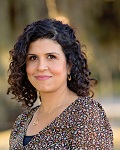2021
Yasmin Moll
- Assistant Professor
- University of Michigan-Ann Arbor

Abstract
The 2011 revolution unleashed both passionate concern and contention about how to create a “New Egypt.” Islamic channels were important sites of these debates as rival television preachers gave media form to their competing visions of what a virtuous life entails and what an ethical polity looks like. Based
on fieldwork in Cairo with the “New Preachers” – so named because of their novel styles of Islamic media – this book explores what on and offscreen debates over the mass mediation of Islam reveal about the diverse conceptions of human flourishing and divine obligation that animate religious revivalism and revolutionary praxis alike. In doing so, it goes beyond a politics of redemption or repugnance to take seriously the social life of theology and its immanent and transcendant stakes. Through public-facing writing, this research enriches ongoing conversations about the complex intersections of religion, media and politics in a moment of resurgent authoritarianism and resistance alike.
on fieldwork in Cairo with the “New Preachers” – so named because of their novel styles of Islamic media – this book explores what on and offscreen debates over the mass mediation of Islam reveal about the diverse conceptions of human flourishing and divine obligation that animate religious revivalism and revolutionary praxis alike. In doing so, it goes beyond a politics of redemption or repugnance to take seriously the social life of theology and its immanent and transcendant stakes. Through public-facing writing, this research enriches ongoing conversations about the complex intersections of religion, media and politics in a moment of resurgent authoritarianism and resistance alike.

